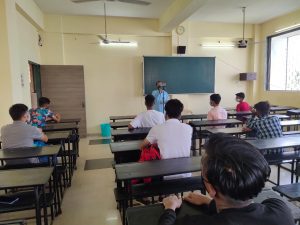
Day 1: Schools reopen in Maharashtra with low student turnout

After an 18-month hiatus because of the COVID pandemic, schools across Maharashtra reopened physical classrooms in a staggered manner on Monday.
State education minister Varsha Gaikwad had given the green signal last week for physical classes to be carried out in rural areas for Classes 5 to 12 and in urban areas for Classes 8 to 12 – but also said “there is no compulsion for students to attend physical classes”, and if they did, they would need a consent letter from their parents.
“We have spent the law few days in taking necessary precautions and implementing government SOPs such as sanitising classrooms, keeping masks at the entrance, as well as putting up posters about COVID awareness on school premises,” said Ajay Kaul, Principal of Children Welfare Centre School (CWC) in Mumbai’s Versova neighbourhood, which caters primarily to children of the fishermen folk of the area.
“Attendance has definitely been low today – around 30 per cent – but at least we have parents taking a stand and sending their child to school,” he added.
Kaul also said they have structured the school timings differently. “We have only 30 benches in each classroom whereas earlier it was around 45. This is primarily because only a single student is allowed on each bench. Physical classes are being conducted in two shifts of three hours each: from 7.15 am to 10.15 am and from 10.30 am to 1.30 pm. We have also set up cameras in classrooms and the entire class is also broadcast online so that students can attend from their homes as well,” the principal explained.
Jacintha Diveyanesan, the school’s in-charge for secondary and junior college, revealed that a total of 100 students attended physical classes on Monday, but expressed confidence that more students would show up in the coming days due to positive word-of-mouth influence.
“It was a great challenge to regularise the school calendar once again,” she said, adding that the best part of day one was that interaction with students happened virtually as well as in-person at the same time.
According to Raju Tadvi, Brihanmumbai Municipal Corporation’s (BMC) Education Officer-in-Charge, 760 of 781 schools in their jurisdiction were reopened on Monday. “We made a few surprise checks at some schools and saw that parents, students as well as teachers were happy to be in school again after so long. The thing is, some of these students don’t have the privilege of an online learning facility at home,” he said, adding that 38,000 students citywide (out of 67,000) attended school physically, which means that at least 50 per cent showed up for classes.
When asked what was the biggest challenge for schools reopening after 18 months, Tadvi said it was primarily parental concern that had to be addressed. “We also had to get the schools sanitised and get the second COVID vaccine dose given to our teachers,” he said.
Not all schools, however, reopened on Monday.
Bhushan Bonde, Principal of Podar International School (ICSE) in Nerul, said they would start physical classes from Tuesday. “We will reopen in a phased manner; we will begin with the ISC students (Classes 10 to 12) followed by Classes 9 and 10, and then Class 8 students. It is important to make these students comfortable in the initial days since they are returning to school after 18 months and undergoing a difficult social challenge.”
Harsh Podar, Director of Podar Education Network, further spoke about great enthusiasm among students and parents about the reopening of schools but also acknowleged parents’ anxiousness about the safety of their children.

“The transition from online school to offline classes demands a great degree of meticulous planning from the schools. The protocol includes strategies such as a complete redesigning of seating plans in classrooms to ensure students are able to maintain social distancing. The management also has to strive to ensure a safe commute for students by making school buses completely safe. This way, parents can rest assured about the safety of their children from the moment they leave for school,” he said.
Podar educational centres have also taken certain safety measures across their institutes. Windows are constantly kept open, school areas are disinfected on a regular basis, and the housekeeping staff at schools is being provided with intensive training to implement a three-step protocol that begins with fumigation of the entire school. The school’s security team will ensure that anybody entering the school – including teachers – shall have a mask on and their temperature is scanned with an IR thermometer.
The Banyan Tree Centre, a self-funded and BMC-registered school located in Dharavi that primarily teaches underprivileged children, had only 170 of 700 students show up for physical classes on Monday. Devanand Dethe, the school’s Founder and President, said: “An unforeseen problem was that the children did not adhere to their dress code while coming to school today. They have worn coloured clothes.”
Also read: 70% of adult population has taken first dose of COVID vaccine: Centre


